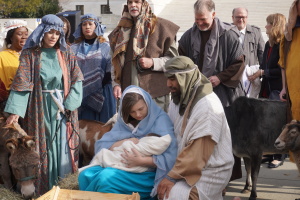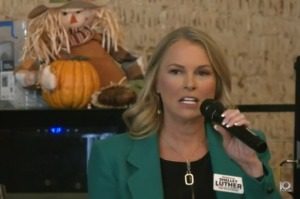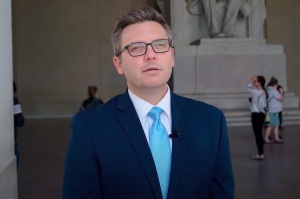Evangelicals and Muslims: Theologians Say Isaac, Ishmael Story Not Significant
Part Three in 'Oil and Water or Fertile Ministry?' Series
When examining the issues between evangelical Christians and Muslims, many point to the history of Isaac and Ishmael as a source of the tension. However, some experts believe the history surrounding Isaac and Ishmael does not play a major role.
According to Steve Strauss, chair and professor of World Missions and Intercultural Studies at Dallas Theological Seminary, the Jews and Christians trace their spiritual ancestry through Isaac while Muslims trace their spiritual ancestry through Ishmael.
"Of course the biblical evidence is clear that Isaac is the physical progenitor of the Hebrew people," said Strauss in an interview with The Christian Post.
"In Galatians 4 Paul uses Isaac as an example of 'children of promise,' of which he includes New Testament believers. This would be the biblical roots of Jews and Christians tracing their lineage through Isaac."
Strauss explained that in the Quran Ishmael is identified as being a prophet of God and present when Abraham establishes his "House." Although the Hebrew Bible says that Isaac was the son of Abraham who was nearly sacrificed, in Islam most believe it was Ishmael instead.
"When the Quran speaks of the near sacrifice of Abraham's son (Surah 37:100-109), the name of the son is not specified, but most Muslims assume it was Ishmael," said Strauss.
Isaac was born of Abraham's wife, Sarah, while Ishmael was born of Sarah's handmaiden, Hagar.
Despite the different lineage, Strauss believes that the efforts of Paul of Tarsus to convert Gentile believers show that the different spiritual lineages should not be an issue.
"By application we can use [Paul's words] to address any system – Muslim, Jewish, Hindu, even works-oriented Christianity that seeks to please God through ritual and good works," said Strauss.
"So I would not put the Ishmael-Isaac distinction at the heart of understanding the difference between Muslims and Christians."
Kamal Nawash, founder and president of the Free Muslims Coalition, told CP that he believes that the Isaac and Ishmael matter is also minor.
"The story of Isaac and Ishmael is NOT significant at all in terms of understanding the theological prospective of Christians and Muslims," said Nawash. "Muslims revere both Isaac and Ishmael equally as God's prophets."
Nawash went further and also stated that "Muslims do not trace their lineage through Ishmael. This is a confusion by many in the West."
Strauss found the treatment of religious minorities to be a greater difference between the worldviews of evangelical Christian and Islamic societies.
"Traditionally, Muslims have been hostile to Christians when they (the Muslims) were in power in a society," said Strauss. "The hostility has ranged from limiting Christians' public rights … and higher taxes on one extreme, to intense persecution on the other extreme."
Scott Horrell, professor of Theological Studies at Dallas Theological Seminary, agreed with Strauss, telling CP what differed between evangelical Christianity and Islam on that issue.
"In theory, Islam is explicit theocracy, with divine authority from top down in all parts of life; there is little if any theological room for democracy, much less for freedom of religion," said Horrell.
"Christianity including evangelicalism professes a triune God (three Persons in one essence); implicitly this allows for personal diversity, and more implicitly it allows for freedom of religious belief."
Strauss also felt that the evangelical mindset was fundamentally a democratic one.
"Evangelicals have traditionally recognized that one can only be a true follower of Christ based in his/her decision to trust and follow him; the decision cannot be coerced," he explained. "So evangelicals have tended to favor an open society with a free interchange of ideas."
Nawash, meanwhile, believes that the religious intolerance noted by Strauss and Horrell is more the product of recent political movements in the Middle East that use religion to gain legitimacy rather than a long-standing theological viewpoint.
"Currently, people in the Muslim world are euphoric about religious political movements because of the belief that they will rule justly with no corruption," said Nawash.
"I expect this to change in the next few years as the winners of today may not be able to produce the prosperity that the people expect."
Regarding cooperation between Muslims and evangelical Christians in the United States, both Strauss and Horrell felt that this could be found in mutual views on faith and morality.
"We can cooperate with non-Christians to advance biblical values that we share in common," said Strauss. "For example, we could cooperate with Muslims in issues like opposition to gay marriage, opposition to abortion on demand and opposition to wider access to pornography."
"Certainly much is similar in our understanding the nature (attributes) of God. Indeed, on this level Christianity and Islam have far more in common than with secular states or non-theistic religions," said Horrell.
"This provides a solid foundation for ethical and social harmony on many issues. There are reasons to join together in fighting abortion, pornography, homosexuality, abuse of women, violence, etc."
Nawash believes that a strong issue that created tension for evangelicals and Muslims in America was their largely different positions on the Israeli-Palestinian conflict as well as the perception that "evangelical leaders have attacked and defamed Muslims over the last 30 years."
Nevertheless, many Muslims in America hold a high opinion of evangelicals due to their "pious nature and obedience to God," according to Nawash.
"Many Muslims in the South of the U.S. prefer to live in neighborhoods with majority evangelicals to avoid the corrupting influence of the cities or secular society," he said.




























